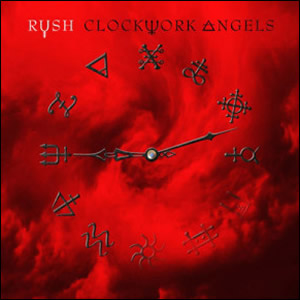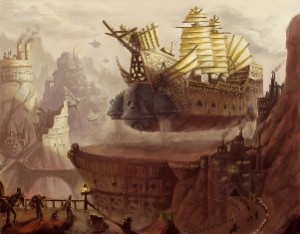Rush’s Clockwork Angels : A Review
June 22, 2012
by J.D. Cook
It’s quite a rush to listen to a new album by the holy triumvirate! I can still recall the excitement in the air when I purchased Snakes and Arrows on a bright May 1st far back in 2007. That album was a true revelation of rock and seeing them twice on the subsequent tour only deepened my appreciation for that album. Since Rush’s return with 2002’s Vapor Trails they have been consistently fantastic in all walks of their careers, appearing on television and in 2009’s I Love You Man. In this late stage of their career Rush has achieved the fame, success, and appreciation that they should have had in their prime. Bands like Aerosmith and the Rolling Stones have become a joke as they attempt to rock into old age and stay in the spot light. Despite being continually wound down by time the men behind Rush (Geddy Lee, Neil Peart, and Alex Lifeson) continue to stay on top financially and musically. The two albums Rush has released since the dawn of the 21st century have been two of their best, but does Clockwork Angels match up to their previous accomplishments?
my appreciation for that album. Since Rush’s return with 2002’s Vapor Trails they have been consistently fantastic in all walks of their careers, appearing on television and in 2009’s I Love You Man. In this late stage of their career Rush has achieved the fame, success, and appreciation that they should have had in their prime. Bands like Aerosmith and the Rolling Stones have become a joke as they attempt to rock into old age and stay in the spot light. Despite being continually wound down by time the men behind Rush (Geddy Lee, Neil Peart, and Alex Lifeson) continue to stay on top financially and musically. The two albums Rush has released since the dawn of the 21st century have been two of their best, but does Clockwork Angels match up to their previous accomplishments?
Before I get into moral values like good or bad I must first do a bit of explanation on why Clockwork Angels is a historic album. Not since 1980’s ‘Natural Science’ has Rush done a true extended concept song and they have not done a concept album since 1978’s Hemispheres. Strangely, although Rush is perhaps best known for concept albums; Clockwork Angels marks their first one. You read that correctly. Their most famous concept work 1976’s 2112 had unrelated singles on it, as did all of their previous and post concept work. This is the first time Rush has dedicated an entire album to a concept; or perhaps more fittingly a story. Rush fans will recognize the importance of this album as it infuses the Science Fiction tales that were present in their early career with the hard rock sound of their latter work.
Now onto the album’s packaging; the first thing fans should note is the time. The clock on the cover of Clockwork Angels is set to 9:12 or 21:12 if you put the first digit of the time into military distinction. The booklet inside the album gives summaries of every song. This is something I dislike as concept work is made better by leaving the better part of interpretation to the readers but at the same time the snippets of story are kept small. Hugh Syme does an awesome job with the art throughout the booklet. In many ways it stimulates the imagination better than the story summaries.
While we are on the subject of the story we might as well discuss it! It’s good. It’s not as new or interesting as Hemispheres or 2112 but it keeps the listener and the thinker  entertained. It follows a young man on adventures throughout his life in a Steampunk world. Steampunk is a sort of art style and fictional setting in which steam powers things like flying wooden ships. The force of order in the story is represented by the Watchmaker and the force of chaos is represented by the Anarchist. The protagonist makes his way from his small farm, through the capital of Crown City to the far north and finally settles down after many adventures and tragedies. Throughout the journey he examines his own metaphysical beliefs, attitudes and outlooks. In many ways this is a musical bildungsroman.
entertained. It follows a young man on adventures throughout his life in a Steampunk world. Steampunk is a sort of art style and fictional setting in which steam powers things like flying wooden ships. The force of order in the story is represented by the Watchmaker and the force of chaos is represented by the Anarchist. The protagonist makes his way from his small farm, through the capital of Crown City to the far north and finally settles down after many adventures and tragedies. Throughout the journey he examines his own metaphysical beliefs, attitudes and outlooks. In many ways this is a musical bildungsroman.
The story and the music starts with ‘Caravan’. This song is probably the most balanced on the album as Lee, Peart, and Lifeson all seem to get a fare share of the musical pie. The story aspect of the song is clearly presented by the lyrics and strong beats back it up. It’s a good start to the album.
‘BU2B’ starts with a slow version of the song played using distorted guitars and voices before Peart’s drums crash in with full effect. It seems like Peart has returned to a younger form of drumming on this album as he crashes from song to song like Keith Moon or John Bonham. This song also has some of the most potent story and metaphysical based lyrics.
“Believe in what we’re told / Until our final breath / While our loving Watchmaker / loves us all to death”.
My only beef with this song is the title. What’s wrong with Brought up to Believe? BU2B makes it sound like a dumb teen text! What is happening to the King’s English? Although it could easily be a commentary on the fact that most teens today are brought up to believe that texting is the way to communicate in English. If that’s the case it’s brilliant, if not…
The first of the three best songs on the album is ‘Clockwork Angels’. The bass and drums dominate this song but the change is fairly interesting throughout. There are even some vocal changes found within. The song lovingly describes four towers dedicated to light, sea, sky and land that are literally clockwork angels in that they are dedicated to the Watchmaker and reach into the heavens.
The best song on the album follows a hardly audible wandering Peddler who crosses the  protagonists path and asks, “What do you lack?” This is an interesting metaphysical prompt between that comes between directly before next song ‘the Anarchist’. As already mentioned the Watchmaker embodies order and god in this Science Fiction tale. The anarchist is the polar opposite to this character. This is the type of person everyone has met; a rebel who fights against every bit of the establishment simply because it is the establishment. The song has a great jam introduction and possibly the best use of guitar on the album. A little more change would be nice but overall this song is great. The bass is also quiet fine and the lyrics are some of the most interesting and thought provoking.
protagonists path and asks, “What do you lack?” This is an interesting metaphysical prompt between that comes between directly before next song ‘the Anarchist’. As already mentioned the Watchmaker embodies order and god in this Science Fiction tale. The anarchist is the polar opposite to this character. This is the type of person everyone has met; a rebel who fights against every bit of the establishment simply because it is the establishment. The song has a great jam introduction and possibly the best use of guitar on the album. A little more change would be nice but overall this song is great. The bass is also quiet fine and the lyrics are some of the most interesting and thought provoking.
“I never wanted to belong / I was so strong”
“What I know I’ve never shown / What I feel I’ve always known / I plan my vengeance on my own”
After this comes the almost equally great ‘Carnies’. Although I find the idea of the protagonist running off to join the circus beyond cliché the song is still great. An awesome guitar rift starts the song before being nearly pounded out of existence by Peart’s drums. The guitar does continue to pop up in the song and the main musical tune of the song is pretty new. The lyrics do little more then develop the plot though. The last bit of the song really rocks out. This is a song I can imagine being great when played live.
Finally the album slows down a bit with ‘Halo Effect’. This song gives a great description of love as we often seek to impose the idea of our perfect lover on a person that is not what we make ourselves see. As Peart puts it, “It’s shameful to tell how / often I fell / in love with illusions again”. This is one of the few songs on this album I actually enjoy in its mellow form. Once it kicks in a bit it loses some tranquil quality it had prior.
‘Seven Cities of Gold’ is the most disappointing song on the album to me because it has such a funky bass beginning. It would have been really awesome if Rush followed through on this beginning with an equally groovy tune but they did not. The lyrics are interesting because they start describing the desert and end describing tundra; so a listener really feels like they went on a lyrical journey. At first it reminded me heavily of ;The Gold it’s in the…’ by Pink Floyd because of the themes but it just gets too repetitive and repeats the line “the seven cities of gold” too many times for me to truly enjoy it.
‘The Wreckers’ is better and contains some of Geddy Lee’s most soothing vocals. There is  also some really fun change throughout the song and the lyrics pop out to me, “all I know is that sometimes the truth is contrary”. The only major disappointment here is the nearly awesome guitar solo that is hinted at as the song fades out. Why does Rush tease me with the full use of Alex Lifeson!?
also some really fun change throughout the song and the lyrics pop out to me, “all I know is that sometimes the truth is contrary”. The only major disappointment here is the nearly awesome guitar solo that is hinted at as the song fades out. Why does Rush tease me with the full use of Alex Lifeson!?
Next up, ‘Headlong Flight’, another song with a really awesome beginning; the bass is joined by the guitar and then the drums which build to a climax. Unfortunately the song sort of fades and repeats the same patterns from there on out. My mind wanders to all the change and complexity in shorter songs like ‘Freewill’ or ‘Spirit of the Radio’; I can’t help wondering why most of these songs stay so close to their home base.
After this the Peddler again asks “what do you lack?” but I have not been able to hear it on the album. Then violins introduce ‘BU2B2’. This song is so short it doesn’t really amount to anything. Essentially Rush’s answer to the Peddler’s question expounded on in ‘BU2B2’ seems to be faith in what you were brought up to believe.
‘Wish Them Well’ follows this and is Rush’s philosophical equivalent to Jesus proclamation to “turn the other cheek” when someone offends or angers you. The drums again crash and pound throughout. The song is a bit boring musically and metaphysically.
Finally the album closes with ‘the Garden’. More strings introduce and surround this song. Lee and an acoustic guitar give this song a sort of eighties power ballad felling at the beginning. This song seems to exist outside of the protagonist’s journey in the story. It is as if this song is Rush singing to the audience. What is really great about this song is that as you listen it it’s constantly adding more layers to itself. Violins are joined by guitar are joined by bass are joined by piano and drums not particularly in that order before the song ends in a more electronic sounding way. This is a very complex, interesting, and good ending to this album.
Overall this album is good. It is vastly different from 2007’s Snakes and Arrows. The album seems to take it easy on Geddy Lee’s voice as he sings in a simpler fashion than in  Rush’s previous work. I personally wonder if the story doesn’t mirror Neil Peart’s life journey. A farm boy reaches fame and success before being struck by tragedy and eventually concluding that love and respect are all that really matter. This would make sense since Peart seems to be the musical focus of the album. It’s also interesting how the album sort of mellows from the first to the last track much like a human life. I wonder if the time motifs are all by design or just sort of random. Unfortunately this album is not all steampunk greatness. Alex Lifeson seems greatly lost throughout the album. His presence is not felt nearly as much as on the two previous albums of this era and that is a bad thing in my opinion. It sort of throws the three piece rock group out of harmony on certain songs. The lyrics can also be a bit preachy on certain songs. Lastly although Rush dedicates a lot of time to some of these songs they don’t seem to do anything with it; many of them repeat keys, rhymes, and melodies throughout when they could have changed a great deal more throughout.
Rush’s previous work. I personally wonder if the story doesn’t mirror Neil Peart’s life journey. A farm boy reaches fame and success before being struck by tragedy and eventually concluding that love and respect are all that really matter. This would make sense since Peart seems to be the musical focus of the album. It’s also interesting how the album sort of mellows from the first to the last track much like a human life. I wonder if the time motifs are all by design or just sort of random. Unfortunately this album is not all steampunk greatness. Alex Lifeson seems greatly lost throughout the album. His presence is not felt nearly as much as on the two previous albums of this era and that is a bad thing in my opinion. It sort of throws the three piece rock group out of harmony on certain songs. The lyrics can also be a bit preachy on certain songs. Lastly although Rush dedicates a lot of time to some of these songs they don’t seem to do anything with it; many of them repeat keys, rhymes, and melodies throughout when they could have changed a great deal more throughout.
Clockwork Angels is still a good Rush album, which is like saying its akin to the greatest album ever made by most bands today, but I do not think it quite measures up to the last two great Rush albums. If you enjoy Progressive Rock, Rush, or good music go give this one a listen. If you don’t like any of these things you probably shouldn’t have read this anyway.
~
J.D. Cook
